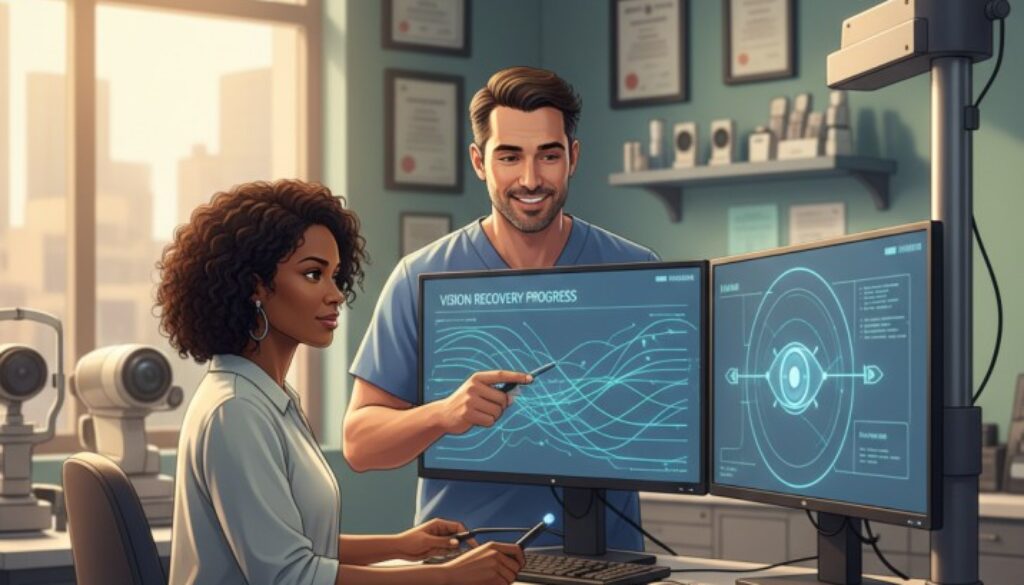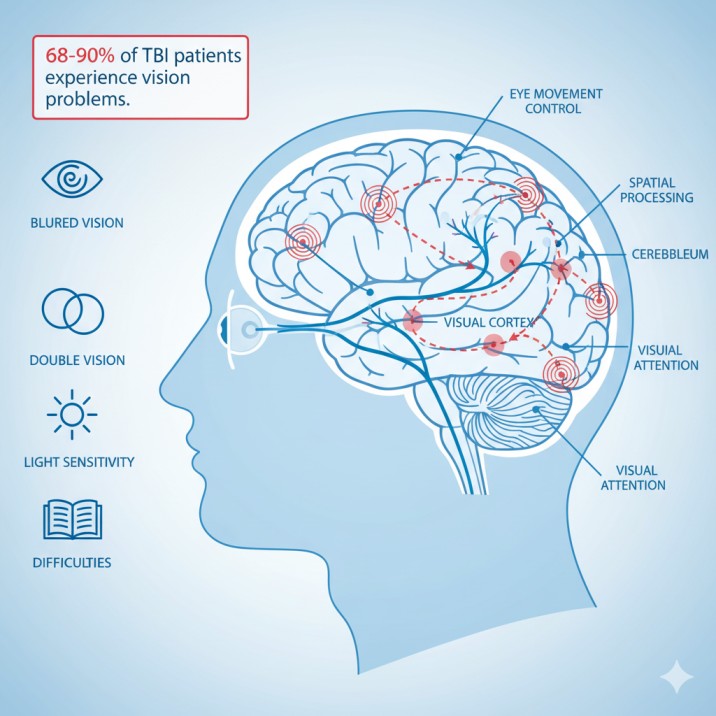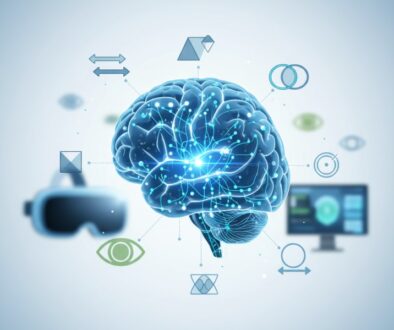Neuro-Optometric Therapy for Brain Injury Recovery

When Sarah experienced a concussion during a car accident, her doctors focused on treating her physical injuries. However, months later, she still struggled with reading, experienced constant headaches, and felt dizzy when moving her eyes. What Sarah didn’t realize was that her brain injury had severely impacted her visual system – a problem affecting 68-90% of traumatic brain injury survivors.
At Cook Vision Therapy Center in Marietta, Georgia, Dr. David Cook has been helping patients like Sarah recover from brain injury-related vision problems for over 40 years. His specialized approach to neuro-optometric rehabilitation has transformed the lives of countless TBI survivors throughout the Atlanta metropolitan area.
Studies consistently show that up to 90% of TBI patients suffer from visual dysfunctions such as blurred vision, sensitivity to light, reading difficulty, headaches with visual tasks, and difficulties with eye movements. Despite these significant statistics, vision problems remain among the most overlooked aspects of brain injury rehabilitation.
Vision therapy, specifically neuro-optometric rehabilitation, has emerged as a game-changing treatment approach for TBI recovery that addresses the root causes of post-injury visual dysfunction rather than simply managing symptoms.
What is Neuro-Optometric Therapy?
Neuro-optometric therapy represents a specialized branch of vision rehabilitation designed specifically for individuals recovering from brain injuries, strokes, and other neurological conditions. At Cook Vision Therapy Center, Dr. David Cook combines four decades of clinical expertise with cutting-edge treatment protocols to help patients recover their vision through therapeutic activities specifically designed to retrain the neural processes of the brain.
Key Differences from Traditional Vision Therapy
While standard vision therapy addresses developmental vision problems, neuro-optometric rehabilitation tackles acquired vision issues resulting from neurological trauma. Dr. Cook’s approach focuses exclusively on treating patients with visual problems caused by TBI, utilizing therapeutic lenses, prisms, filters, and specific eye exercises to retrain affected brain regions – making Cook Vision Therapy Center a leading destination for brain injury vision rehabilitation in the Southeast.
How Brain Injuries Disrupt Visual Function
Following a TBI, there is often an interruption in communication between the eyes and the brain. This disruption occurs because vision processing involves extensive neural networks throughout the brain, making it particularly vulnerable to injury.
Common Visual Problems After Brain Injury
Oculomotor Dysfunction (Eye Movement Problems)
- Eye tracking difficulties: Inability to smoothly follow moving objects
- Saccadic dysfunction: Problems with quick eye movements between targets
- Convergence insufficiency: Difficulty bringing eyes together for near tasks
Visual Processing Issues
- Visual field defects: Loss of peripheral or central vision areas
- Visual perception problems: Difficulty interpreting what is seen
- Visual memory deficits: Trouble remembering visual information
Accommodation and Focusing Problems
- Blurred vision: Inability to maintain clear focus
- Focusing inflexibility: Difficulty shifting focus between distances
- Eye strain and fatigue: Exhaustion from visual tasks
The Science Behind Vision Therapy for TBI Recovery
Recent research has provided compelling evidence for the effectiveness of neuro-optometric rehabilitation. A 2024 systematic review published in the Oman Journal of Ophthalmology analyzed neuro-optometric rehabilitation effectiveness, finding statistically significant improvement in reading ability and reading rate after computer-based oculomotor training.
Three Key Scientific Studies Supporting Vision Therapy
Study 1: 2024 Systematic Review on Adult Oculomotor Challenges Researchers reviewed literature from 2000-2022, analyzing various neuro-optometric interventions and finding consistent improvements in oculomotor function and visual symptoms across multiple studies.
Study 2: 2018 Journal of Optometry Research. A study found that 100% of participants experienced improved eye movement following approximately 10 hours of neuro-optometric rehabilitation therapy.
Study 3: NORA Brain Injury Research The Neuro-Optometric Rehabilitation Association confirms that studies show up to 90% of TBI patients suffer from visual dysfunctions, establishing the critical need for specialized vision rehabilitation.
Comprehensive Treatment Approaches in Neuro-Optometric Rehabilitation
At Cook Vision Therapy Center, Dr. David Cook’s comprehensive treatment approach combines both in-office and home-based rehabilitation programs, developed through over 40 years of specializing exclusively in brain injury-related vision problems.
In-Office Therapy Techniques
Oculomotor Training Dr. Cook’s oculomotor therapy focuses on improving the functioning of the muscles that control eye movements through exercises designed to improve eye tracking, focusing, and teaming skills. This foundation of neuro-optometric therapy helps retrain damaged neural pathways using specialized equipment and techniques refined over four decades of clinical practice.
Computer-Based Visual Training Modern neuro-optometric rehabilitation incorporates sophisticated computer programs that provide precise control over visual stimuli, allowing therapists to target specific deficits with measurable progress tracking.
Prism and Lens Therapy Prism lenses are frequently prescribed as part of vision therapy for binocular vision problems to eliminate double vision, and are often used to treat poor balance, which is a common symptom post-concussion.
Home-Based Rehabilitation Programs
Structured Exercise Protocols: Patients receive customized home exercise programs featuring specific activities targeting their individual visual deficits, including visual tracking exercises, convergence training, and accommodation exercises for focusing flexibility.
Technology-Enhanced Training Virtual reality applications and tablet-based programs now supplement traditional home exercises, providing engaging, measurable rehabilitation activities.
Treatment Timeline and Success Expectations
Understanding the TBI recovery timeline helps patients and families set realistic expectations for neuro-optometric therapy outcomes.
Typical Recovery Phases
Phase 1: Initial Assessment and Stabilization (Weeks 1-2) Comprehensive evaluation identifies specific visual deficits and establishes baseline measurements. Initial therapy focuses on addressing the most debilitating symptoms.
Phase 2: Active Rehabilitation (Weeks 3-12) Research shows that after just 6 weeks of treatment, patients with mild TBIs had improved reading rates and decreased visual symptoms. However, complete recovery typically requires 3-6 months of consistent therapy.
Phase 3: Functional Integration (Months 3-6) Advanced therapy emphasizes real-world application of recovered visual skills, ensuring patients can effectively use their improved vision in daily activities.
Realistic Success Expectations
According to research published in the Journal of the American Academy of Optometry, 218 post-concussion patients given visual rehabilitation showed that a vast majority of participants experienced improvements in their conditions. At Cook Vision Therapy Center, Dr. David Cook’s four decades of experience treating TBI-related vision problems have resulted in successful outcomes for thousands of patients throughout the Atlanta metropolitan area.
Success rates vary based on injury severity, time since injury, patient compliance, and age factors. Dr. Cook’s extensive experience allows him to provide an accurate prognosis and customize treatment protocols for optimal results. Earlier intervention generally yields better results, with younger patients often demonstrating faster recovery under his specialized care.
Integration with Comprehensive Brain Injury Rehabilitation
Successful TBI recovery often requires a multidisciplinary approach where neuro-optometric therapy works alongside other rehabilitation services.
Multidisciplinary Team Approach
An interdisciplinary, integrated team approach plays a vital role in the rehabilitation of patients with concussions, stroke, or other neurological deficits, including optometrists, physical therapists, occupational therapists, speech-language pathologists, and neurologists.
When Vision Therapy Should Begin. Visual problems are often overlooked during the initial treatment of brain injury. Early identification and treatment are crucial for optimal recovery outcomes:
- Immediate post-injury: Basic vision screening
- 2-4 weeks post-injury: Comprehensive neuro-optometric evaluation
- 1-3 months post-injury: Active rehabilitation initiation
- Ongoing: Regular progress monitoring and treatment adjustment
Specialized Treatments for Different Brain Injury Types
At Cook Vision Therapy Center, Dr. David Cook’s neuro-optometric therapy approaches vary based on the type and severity of brain injury, with customized treatment protocols developed through over 40 years of exclusively treating brain injury-related vision problems.
Concussion and Mild TBI
Post-concussion vision syndrome affects a significant percentage of concussion patients. Dr. Cook specializes in treating Post Traumatic Vision Syndrome (PTVS), where the eyes are physically healthy but not communicating properly with the brain. His extensive experience with concussion patients throughout the Atlanta area has established Cook Vision Therapy Center as a leading destination for post-concussion vision rehabilitation.
Common Concussion Vision Symptoms:
- Reading difficulties and eye strain
- Light sensitivity (photophobia)
- Double vision or blurred vision
- Headaches triggered by visual tasks
- Balance problems related to visual-vestibular integration
Stroke-Related Vision Issues
Stroke survivors often experience visual field defects, eye movement problems, and visual processing difficulties requiring specialized rehabilitation approaches.
Severe TBI and Complex Cases
Patients with severe brain injuries may require intensive, long-term vision rehabilitation combining multiple therapeutic modalities and assistive technologies.
Insurance Coverage and Cost Considerations
Vision therapy coverage varies by insurance provider. When deemed medically necessary for brain injury rehabilitation, it may be covered under medical insurance rather than vision insurance.
Key Coverage Factors:
- Medical necessity documentation from a brain injury
- Pre-authorization requirements
- Detailed medical records showing functional impact
Typical Costs (2024-2025):
- Initial evaluation: $300-600
- Therapy sessions: $150-250 each
- Treatment duration: 12-24 sessions over 3-6 months
Family Guide: Supporting Recovery
Family involvement is crucial for successful TBI recovery, and understanding the neuro-optometric therapy process helps caregivers provide optimal support.
Emotional Support Strategies
Brain injury survivors often experience frustration, anxiety, and depression related to their vision problems. Family members can provide crucial emotional support by acknowledging the reality of invisible disabilities, celebrating small progress milestones, and maintaining patience during setbacks.
Practical Support Measures
- Environmental modifications: Reducing visual clutter, optimizing lighting
- Transportation assistance: Helping with therapy appointments
- Home exercise support: Encouraging compliance with prescribed exercises
Communication with Healthcare Providers
Essential Questions to Ask Your Neuro-Optometrist:
- What specific visual functions are affected?
- What is the expected timeline for improvement?
- How can we support therapy at home?
- What signs indicate progress or problems?
- When should we expect to see functional improvements?
Future Directions in Vision Therapy Technology
Advanced technologies are revolutionizing neuro-optometric therapy and improving TBI recovery outcomes through innovative treatment methods.
Emerging Technologies
Virtual Reality Applications VR-based vision therapy offers immersive, controlled environments for practicing visual skills while providing precise measurement of progress.
AI-Enhanced Treatment Planning Artificial intelligence systems are beginning to analyze patient data to optimize treatment protocols and predict recovery outcomes.
Telehealth Integration: Remote monitoring and therapy sessions are expanding access to specialized neuro-optometric care, particularly important for patients in underserved areas.
References and Key Resources
- Impact of Neuro-Optometric Rehabilitation – 2024 Systematic Review
- NORA: About Brain Injuries & Vision
- Consensus Statement on Visual Rehabilitation in mTB
Conclusion: Vision Rehabilitation as Essential Brain Injury Care
The evidence overwhelmingly supports vision therapy as a critical component of comprehensive brain injury rehabilitation. The most common method of treating patients with vision symptoms caused by a brain injury is with neuro-optometric rehabilitation, which addresses specific visual deficits and aims to “rewire” the brain using specific tools and eye-training exercises.
For brain injury survivors and their families, understanding that vision problems are treatable – not permanent disabilities – provides hope and direction for recovery. Early intervention, appropriate specialist care, and consistent rehabilitation can significantly improve quality of life and functional outcomes.
Key Takeaways:
- Vision problems affect 68-90% of brain injury survivors, depending on injury type and severity.
- Neuro-optometric therapy offers evidence-based treatment solutions
- Early intervention typically produces better outcomes
- Multidisciplinary care enhances recovery potential
- Family support plays a crucial role in rehabilitation success
- Insurance coverage varies, but may be available for medically necessary treatment
If you or a loved one has experienced a brain injury and is struggling with vision-related symptoms, consult with a qualified neuro-optometric rehabilitation specialist to explore treatment options. Recovery is possible, and specialized vision therapy can be a transformative component of your rehabilitation journey.
For patients in the Atlanta, Georgia area, Cook Vision Therapy Center offers comprehensive neuro-optometric rehabilitation with Dr. David Cook’s four decades of specialized expertise. Contact Cook Vision Therapy Center in Marietta to schedule your comprehensive TBI vision evaluation and begin your journey toward visual recovery.
FAQs
-
Vision therapy retrains the connection between the eyes and brain through specialized exercises, prisms, and lenses to address visual dysfunction caused by traumatic brain injury, stroke, or concussion.




